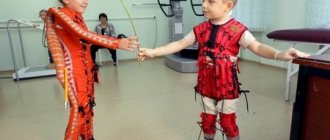Free higher education in Russia is given only once. Entrusting the choice of profession to schoolchildren, when many graduates are not even 18 years old, is a dangerous decision. According to Rosstat, only about 40% of the population works in our specialty. The numbers not only hint, they shout that more than half of graduates wasted several years on unnecessary studies.
The Lifehacker Telegram channel contains only the best texts about technology, relationships, sports, cinema and much more. Subscribe!
Our Pinterest contains only the best texts about relationships, sports, cinema, health and much more. Subscribe!
The normal desire of parents is to help their child make a choice. The only question is how to do it.
Nurture independence in your child
Unfortunately, it’s too late to do this a year or two before graduation; you should have raised an independent child from birth, but it’s better to start at least someday. The main rule in career guidance is simple:
The child must choose a profession himself.
Only the person himself knows what he needs. And this is the only way the child will not blame his parents if something goes wrong, or think that he missed his chance.
I wanted to study acting. But dad said that all the actors stay in the regional theater, earn little and become drunkards. An engineer is another matter. I was obedient and entered the radio department. It was fun at the polytechnic, I took part in the student spring for 6 years, but I have zero knowledge in my head, as well as the desire to work as an engineer, even though I have a master’s degree. Because of this, all my life I have been haunted by a feeling of unfulfillment and thoughts that everything could have turned out somehow differently. Although I understand that dad is right and the work of actors is bestial. I don’t blame my parents, I blame myself for not doing what I dreamed of.
Maria
editor
A rare case: a child knows what he wants
There are only a few people with a clearly defined calling. If you get such a child, he will tell you quite early on what books to buy him, what museums or theaters to take him to, and what classes to sign up for. Such a child has a very directed interest and will. With such a child, parents “simply” solve the problem of how to create decent conditions for his development.
But even such children's interest is not always narrowly focused. For example, a boy is interested in geology and chemistry, like Artem Oganov, who became a world-famous crystallographer. Or a girl who loves cooking and science, like Chrissy Jilek, who became a food technologist and invents candy with new flavors.
Find out what professions are in demand
Only they are actually in demand, and not “prestigious”. To understand this, you don’t need to read the selections and ratings. We need to open the websites of employment centers and websites that help in finding a job, and look carefully at the vacancies.
Grandfather advised me to choose something related to foreign languages, because it is in demand. I tried it, got carried away, so it was easy to follow his advice. The demand faded into the background because it became interesting. Now I’m in my favorite job in the IT field. Grandpa won't give you bad advice!
Angelina
translator
Viewing vacancies helps assess the popularity of the profession, possible salary and requirements for applicants. It may turn out that one higher education is not enough for your dream job: at the same time you need to learn languages and attend some courses.
Show the profession from the inside
Adults have a large circle of acquaintances with a variety of specialties. Ask your friends to tell your child what and how they do at work. It is important to hear about the most common everyday activities. For example, about how you have to write letters, how to work with drawings in real conditions, how you have to arrive promptly at eight in the morning, how to fill out reports and drink tea with accounting.
Many businesses hold open days. At such events, you need to ask the right questions: not about high performance and a great goal, but about routine, the organization of work places.
My parents are teachers. They told me not to go into teaching, so I didn’t go.
Lida
advertising specialist
We have a vague idea about many professions. It is better to get to know the work better than to spend several years and face a conflict between expectations and reality.
It is also important that health must correspond to working conditions. It is possible to understand whether a child can handle it or not only in combat conditions or at least during a frank conversation with a representative of the profession.
Find study options in other cities and countries
Often we don’t even know where we can work and who we can work with; we have no idea what specialties are available at universities even in neighboring cities, not to mention universities on the other side of the country. And completely in vain.
When the time came to choose who to be, I was only 15 years old. In my city it was impossible to study in the specialty I dreamed of, and the school had a different profile. To enroll, you had to transfer to another school, study according to a special program, travel several hundred kilometers to another city and submit documents. I couldn’t pull it off, and my parents weren’t puzzled; in the end, I chose a profession from those that were available nearby. I'm almost 30, I still regret it.
Nastya
copywriter
Of course, moving a child to another city is not a joyride in the park; supporting a student from a distance is more difficult. But it's worth it if we're talking about a profession for life.
Difficulties in choosing a specialization
It is often not easy for a child to decide on a profession. This is directly related to one of the problems of modern teenagers - lack of independence. It develops even in the elementary grades, when parents do homework with them and take them to tutors. This usually ends in high school, when the teenager protests against parental guardianship. But he cannot solve his problems on his own, because he does not know how. It is necessary to teach children independence from an early age. A good place to start is by letting them work on their homework themselves.
The main difficulty is the lack of career guidance methods in school. Abroad, from early childhood, a person’s strengths are identified by conducting many tests. With their help, they determine in which direction the child should develop. We don't have that. Therefore, the family should help with choosing a profession. Parents, observing their children, determine their skills and inclinations. To develop them, you can send your child to the appropriate club or section.
Currently, many professions are disappearing and new ones are taking their place. It is not always possible to find information about them. Therefore, the child has difficulty imagining what this or that specialization is. This makes it difficult to choose.
The student’s motivation plays an important role in determining a profession. But it is not always correct. Children often listen to the opinions of others, which may be wrong. And such a motive as the prestige of a future profession is a very relative concept.
Don't confuse your favorite lesson at school and profession
Standard logic: if you're good at mathematics, go study to become a computer scientist; if you're good at literature, go become a philologist; if you don't like anything, then go for a manager's degree, there's an Unified State Examination in social studies.
This knowledge needs to be tailored to the goal, and not choose a job based on knowledge.
You need to choose a profession that will help your child earn money, and not a favorite subject. Maybe a child likes a teacher, a comfortable office and beautiful visual materials, but nothing like that will happen in the profession.
Don’t force me to go to college
If the child has not yet decided who to be, give him time and the opportunity to think about who to become. Nothing (except the boys’ fear of the army) prevents them from working for a couple of years after school, getting acquainted with real life, devoting time to educational courses and finding themselves. If you can't imagine not studying after school, try college. There the exams are simpler, the cost of training is lower, and you will get a ready-made profession faster.
My mother forced me to go to a technical college (at the age of 15 I did not have the right to vote), which I was not very happy about, so I tried with all my might to get me expelled. Did not work out. After college, I myself already chose a university and a specialty. Now I don't regret it. After college, I was sent to practice at AvtoVAZ. At the age of 18, I already had a normal position and salary.
Maria
manager
The craze for higher education does not lead to anything good. Often a diploma is just a piece of paper with not an ounce of knowledge and skills behind it. But there are several years lost and hundreds of thousands spent.
Don't force me to finish my studies
In the period from 18 to 23 years old, a person grows up sharply; this is the age of formation. Sometimes the eyes open and the student realizes that he is not doing his own thing: he finds a more interesting specialty, and realizes what his goal is. As a rule, this is a more conscious choice than the decision of yesterday’s student; such a turn will bring more benefits than the dull receipt of a diploma, because “once you start, finish.”
After ninth grade, the class teacher advised my mother to send me to a technical school. My parents didn’t really choose, but sent me to construction, because all my mother’s colleagues were graduating from it. I was told that the main thing is to get a diploma. I obediently agreed. I suffered for four years. Afterwards, I independently decided to get a higher education in another specialty. My parents agreed, although they said: “Was it really a waste of four years of schooling?”
Anton
designer
An education diploma and several years of study are not a contract for life. Everything can be changed at any moment. Don't forget to tell this to a child who isn't sure what he or she has chosen.
12–15 years old: see what you like best
If until the age of 12 a child tried different activities, then in adolescence he begins to be attracted to some area: mathematics, technology, nature, drawing. Then you need to help the child get to know this particular area better: what directions there are in it, what you can do, how all this is built into people’s lives.
It is important that the child is introduced to the area of interest not by a parent, but by another authoritative adult: a good school teacher, a teacher in a studio or circle, a family friend. With the support of such an adult, the child will be more receptive, engage better and discover professional opportunities.
Checklist for a caring parent
Briefly about what to do to help your child:
- Do not insist on your choice and let the child decide for himself what to do.
- Tell us what professions are needed now.
- Offer those professions that will interest the child, and not those that a test or grade in a magazine will suggest.
- Give as much information as possible about different professions.
- Show non-obvious solutions: specialties that have not been heard of in your field.
- Don’t force yourself to study for the sake of a diploma: it’s better to spend a couple of years on self-determination, and then find the ideal profession.
Did your parents help you with your choice?
Helping teenagers from science
How to help a teenager choose a future profession can be helped by the research of Doctor of Psychology E. A. Klimov, who classified almost all existing professions according to the nature of the work ahead:
- Man-nature , uniting people who are passionate about nature, flora and fauna, its study, and maintenance. This category includes geologists, veterinarians, forestry, agricultural, and livestock workers.
- Man-technology , a profession in which the main criterion is working with technology. Programmers, mechanics, engineers and the like.
- Human-human , all areas of professional activity that require communication with people - teachers, managers, salespeople, doctors.
- Man-sign , uniting professions that require painstaking work with documents. For example, accountants, journalists, lawyers, economists, businessmen, secretaries.
- Man-artistic image . These are all professions related to art - artists, actors, singers, film directors - that is, those professions that require a special mindset, thinking in images.
Parents know their child best. Based on the research data, it is necessary to classify a teenager to some point that combines the qualities and character of a future specialist and choose a profession according to his abilities and preferences. After all, the chosen path should bring not only material security, but also joy and pleasure from the work done. What profession to choose is up to young people to decide, but parents are obliged to provide maximum assistance to protect the teenager from mistakes.
The chosen specialty is considered correct and successful if the young man rushes to work with joy, devotes all the allotted time to it, without counting down the hours until lunch and the end of the work shift. Unfortunately, only 24% of the young professionals surveyed were able to find a job they liked, combining the required qualities with a hobby.









